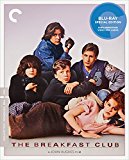| Reviews & Columns |
|
Reviews DVD TV on DVD Blu-ray 4K UHD International DVDs In Theaters Reviews by Studio Video Games Features Collector Series DVDs Easter Egg Database Interviews DVD Talk Radio Feature Articles Columns Anime Talk DVD Savant Horror DVDs The M.O.D. Squad Art House HD Talk Silent DVD
|
DVD Talk Forum |
|
|
| Resources |
|
DVD Price Search Customer Service #'s RCE Info Links |
|
Columns
|
|
|
Breakfast Club: The Criterion Collection, The
The Criterion Collection // R // January 2, 2018
List Price: $39.95 [Buy now and save at Amazon]
The Film:
Over the years, from when I was just shy of being a teenager to some point in college, the comedies of John Hughes were a recurring stable on a basic cable channel. During that period, while more consumed with action-based antics involving caped crusaders, lightsabers, and ninja turtles, my TV surfing during breaks from those things would routinely stop on that channel upon seeing a spacious library with a group of teenagers settled or settling in for detention. Their language and lingo were observably different than mine, my personality never lined up seamlessly with any of the characters, and the absence of action probably should've driven my attention toward something else … but it didn't. Something drew my attention to the individual facets of each of the teenagers involved in The Breakfast Club, even at a young age, and I found myself identifying with different details of each student -- seeing bits of myself in each -- as the complicated years of adolescence went by and I routinely stopped on the channel to watch it again, seeing if I've taken on a new trait while growing up.
If others are like me, this experience changes a bit as one gets older and moves beyond the ages of the students stuck in detention at Shermer High School on that Saturday morning. Adults begin to settle into the personalities that they've become, and a change happens in how the cluster of five students are viewed as they plop down in their chairs and get ready for, essentially, a work day's amount of sitting around and doing nothing outside of a required essay, contemplating the negative impacts of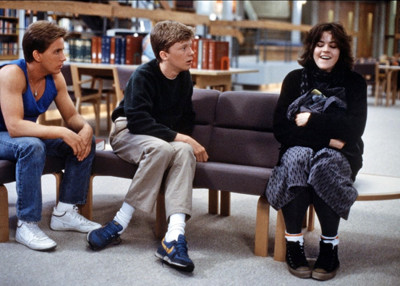 their actions. Instead, reminiscence takes over as one watches a brain (Anthony Michael Hall), an athlete (Emilio Estevez), a basket case (Ally Sheedy), a princess (Molly Ringwald), and a criminal (Judd Nelson) start to interact with one another, outside the earshot and visible range of vice-principal Vernon (Paul Gleason). The camaraderie and clashes between these divided personality types that speak directly to high-school aged people becomes a representation of past growing pains: a reflection of how individuals mature and develop awareness of others. With time, it becomes a reminder, both of what's been overcome and what kids of that age go through to reach adulthood.
their actions. Instead, reminiscence takes over as one watches a brain (Anthony Michael Hall), an athlete (Emilio Estevez), a basket case (Ally Sheedy), a princess (Molly Ringwald), and a criminal (Judd Nelson) start to interact with one another, outside the earshot and visible range of vice-principal Vernon (Paul Gleason). The camaraderie and clashes between these divided personality types that speak directly to high-school aged people becomes a representation of past growing pains: a reflection of how individuals mature and develop awareness of others. With time, it becomes a reminder, both of what's been overcome and what kids of that age go through to reach adulthood.
In terms of how the plot develops, not a lot happens in The Breakfast Club, similarly to the amount of stuff that happens in detention itself. The premise anchors the characters to a single location for eight hours, and the barest of movement, even between nearby desk chairs, is observed as something significant in the story, let alone if they find a way of sneaking out of their Saturday imprisonment for whatever reason. Instead, the film's interest arises once the characters start to disclose more about themselves, at first hesitantly and later with the compulsion to reveal what they're hiding underneath … the versions of themselves that don't conform to their labels. John Hughes smartly plays with stereotypes and personality types once their guards are lowered, and they're able -- and, to different degrees, willing -- to see one another for who they really are, hinged on topics from sexual activity, parties, and drugs to how their parents treat them and where they're headed. In a school environment, it can be hard to look beyond base evaluations of people, and breaking through that to see nuanced individuals is a big part of growing up.
By Hughes' design, each character strongly projects their individual stereotypes at first, exaggerated for effect both on a cinematic level and, in a way, on a meta level. By having the characters represented as such clear-cut depictions of who they're pigeon-holed into being, it makes the process of breaking down their barriers more apparent and humorous, eventually transforming into starker before-after contrasts than if they had been presented as multi-layered characters from the get-go. Their rigid embodiment of the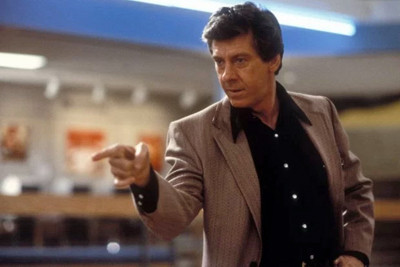 stereotypes are also easy to stomach since people, both young and old, can fall into the trappings of their social labels, making it easy for rich princesses to feel comfortable eating sushi at a detention lunch and for ostracized weirdos to feel comfortable shaking dandruff onto a landscape illustration to create "snow". Also, writer/director Hughes takes into consideration the inherent compulsion of people to evaluate others based on impressions and outward appearances, how they're summarized through inference and labeling, a real-world experience worked into his teen comedy by prompting the audience -- whether they want to or not -- to see and find amusement in the surface before going deeper.
stereotypes are also easy to stomach since people, both young and old, can fall into the trappings of their social labels, making it easy for rich princesses to feel comfortable eating sushi at a detention lunch and for ostracized weirdos to feel comfortable shaking dandruff onto a landscape illustration to create "snow". Also, writer/director Hughes takes into consideration the inherent compulsion of people to evaluate others based on impressions and outward appearances, how they're summarized through inference and labeling, a real-world experience worked into his teen comedy by prompting the audience -- whether they want to or not -- to see and find amusement in the surface before going deeper.
Eventually, of course, it's revealed that more -- perhaps not much more, but more -- lies under those surfaces of the five teenagers than initially led on, and it's seeing how similarities and kinships form despite their differences that keeps The Breakfast Club so relevant over time. Even though he's the most volatile and obnoxious by a wide margin, Judd Nelson's John Bender also becomes the catalyst for the rest to break the rules, speak up, and genuinely communicate with one another, and the sparks of his wounded, closeted personality underneath the gruff surface earn him genuine sympathy while rubbing his detention mates the wrong way. Bender's the focal point, and the rest eventually feel disarmed enough by his brazen attitude to come out of their own shells, to which the credible performances from all involved expose the pressures that each of their characters deal with behind the scenes: the necessity of earning college scholarships based on consistent performance; the complications of popularity, both gaining and maintaining it or not caring about it; and the complicated relationships they share with their parents.
Something unexpected popped up this latest time of watching The Breakfast Club, though, hinged on a flicker of a moment featuring vice-principal Vernon. From the beginning, he's framed as the overbearing and control-hungry villain through his generally unpleasant demeanor, delivered with amusing sternness in a way only Paul Gleason could've done. Yet, there's a key moment after one of his intense, dramatically potent outbursts of scolding that the point-of-view catches a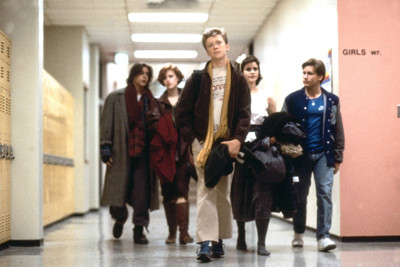 look at him exhaling, closing his eyes, and shaking off visible stress: a piece of the iconic "cracking skulls" scene that gets overlooked (or, in clips, cut off). In one's younger years of unanimously siding with the teenagers, that moment might be viewed as just a breath following a tense moment. Older viewers might pick up on more from that expression, though, in which the trickiness of correctly handling problem kids -- the responsibility of slightly influencing that generation's youth -- clearly weighs on him. He's still an unmistakable jerk, indisputably revealed in later interactions, but there's a glimmer of sympathy felt for his position there.
look at him exhaling, closing his eyes, and shaking off visible stress: a piece of the iconic "cracking skulls" scene that gets overlooked (or, in clips, cut off). In one's younger years of unanimously siding with the teenagers, that moment might be viewed as just a breath following a tense moment. Older viewers might pick up on more from that expression, though, in which the trickiness of correctly handling problem kids -- the responsibility of slightly influencing that generation's youth -- clearly weighs on him. He's still an unmistakable jerk, indisputably revealed in later interactions, but there's a glimmer of sympathy felt for his position there.
That's one of the more remarkable aspects of The Breakfast Club: while impressions of John Hughes' cautious, considerate mix of exaggerated and nuanced characterization may change with time, they don't seem to get outright replaced by cynicism or frustration with the detention-goers. In the growingly complex world of adulthood, the urge might come up for some individuals to look at most of their concerns with world-weary eyes and deem them as overblown, as facets of youth that'll be conquered as they approach the true trials of the post-high-school existence. Hughes' craftsmanship holds the ability to sidestep those inclinations, perhaps even serving as a reminder to not engage in that kind of stereotyping in the adult world, all the while grasping onto the idea that the concerns of youth and how they'll conquer them, both trivial and momentous, are indeed significant and will shape how they'll handle the challenges in the years to come. Watching The Breakfast Club over a matter of decades has become an exercise in evolving personal outlooks and appreciation, making it hard to forget about it.
The Blu-ray:
The Breakfast Club becomes the somewhat divisive first entry into the Criterion Collection from the works of John Hughes, presented in the standard clear keepcase design from the boutique label, introduced as Spine #905. Criterion keeps things simple with the familiar stock photo of the five primary cast members adorning the front cover artwork, while another full-cast photo spreads across the interior artwork. Creativity comes in the disc design, a depiction of scrawls one might've found on "basketcase" Allison's desk during detention, while the Booklet features pink lined pages, snippets from the script, tchotchkes from the film, and behind-the-scenes photos scattered throughout. Inside, information about the transfer and production credits have been included, as well as an essay, "Smells Like Teen Realness" by David Kamp.
Video and Audio:
This marks the third time that The Breakfast Club has been presented in a different Blu-ray package over the past decade, including a 30th Anniversary Edition remastering from Universal that took great strides to clean up the harsher, less lifelike, yet still acceptable appearance of their first attempt. Had this presentation from Criterion been the one that followed the original release, I'd be singing its praises from the rooftops, as it's a rich (sometimes warmer, others a tad cooler) extremely well-detailed, and natural rendering of the ‘80s film at its intended aspect ratio of 1.85:1, created on an ARRISCAN scanner from the original 35mm negative. Thing is, the differences between this disc's transfer and that of the 30th Anniversary release from three years prior are imperceptible at best, perhaps nonexistent. While that's a great thing for fans of the film wanting a cohesive viewing experience between the prior edition and the coveted Criterion Collection edition, it presents less initiative to upgrade from the prior disc. If you have the first Blu-ray or haven't bought The Breakfast Club at all, however, it's certainly the one to get, as it's been beautifully remastered and restored at 4K under Universal's supervision.
Similar comments can be passed between the two 5.1 DTS-HD Master Audio tracks present on each of the recent Blu-rays for The Breakfast Club: they're satisfyingly clear and capture the atmosphere of library detention, but they also sporadically have twang of thirty years and come across as glorified mono tracks, with ever-so-slight steps of activity over into the front surrounds and wisps into the back. Luckily, The Criterion Collection does contain a boost in the value of the audiovisual presentation here, also offering the original monaural sound design in an LPCM track, derived from the original 35mm negative. It's an improvement, too … in the areas where it can, of course. The presence of sounds effects -- the squeaking of shoes, the hocking of loogies, and the bouncing of a basketball -- thankfully lacks some of the overzealous clarity and levity of the Master Audio track, finding a more comfortable and purely cleaner comfort zone in the center channel. Dialogue also sounds crisper yet more organic within the LPCM presentation, while the music sounds about as excellently balanced as it did before. Having the choice for uniformity's sake is nice, but the LPCM track's the way to go.
Special Features:
If there's an area where this Criterion Collection presentation of The Breakfast Club could unarguably earn the double-dipping price of admission, it's in the extras department. It has some moderately big shoes to fill in comparison to the 30th Anniversary Edition, too, which contained an Audio Commentary with Judd Nelson and Anthony Michael Hall and nearly an hour's worth of behind-the-scenes examinations with the Sincerely Yours (51:00, 16x9 HD) featurette slate. Now, Criterion haven't carried over all the extras from that disc -- they've ditched a trivia track and a five-minute look at the creation of the "Brat Pack" -- but they have brought over those two crucial substantive extras for fans of the film. The commentary track with Nelson and AMH (and moderator Jason Hillhouse) remains a decent enough listen in terms of details revealed about the production design, actors, and the ideas explored, but runs out of steam as the track continues on and gets in a rhythm of narrating and lightly responding to the movie itself. But, at least it's there!
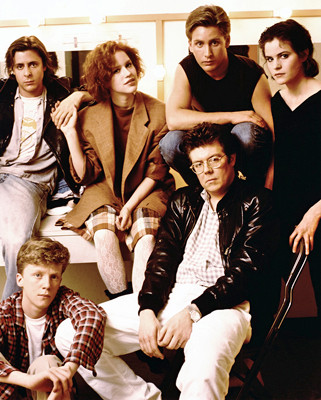 Instead, The Criterion Collection deepen the value of their package with their own slate of extras, which includes some newly created specifically for this release and a handful of other archival pieces. The Cast and Crew wing of the extras includes a series of archival interviews with actors Judd Nelson (12:36, 4x3 HD), Ally Sheedy (15:23, 4x3), Paul Gleason (11:09, 4x3) and studio teacher Irene Brafstein (8:58, 4x3 HD); specifically in the case of Nelson and Sheedy, it's entertaining to see them in full costume, yet not in character and talking about their experiences shooting the film with John Hughes. Starting the interviews off, however, is a newly-recorded one from 2017 with Molly Ringwald and Ally Sheedy (18:38, 16x9 HD), in which both offer candid recollections of how they got involved with Hughes at that point in their careers, how Hughes was able to lower the actors' guards and draw out their characters, the play-like nature of the script and how it evolved leading up to shooting, Hughes' connection to the teenage experience, and the role that editor Dede Allen played in ensuring Hughes got all the footage he needed.
Instead, The Criterion Collection deepen the value of their package with their own slate of extras, which includes some newly created specifically for this release and a handful of other archival pieces. The Cast and Crew wing of the extras includes a series of archival interviews with actors Judd Nelson (12:36, 4x3 HD), Ally Sheedy (15:23, 4x3), Paul Gleason (11:09, 4x3) and studio teacher Irene Brafstein (8:58, 4x3 HD); specifically in the case of Nelson and Sheedy, it's entertaining to see them in full costume, yet not in character and talking about their experiences shooting the film with John Hughes. Starting the interviews off, however, is a newly-recorded one from 2017 with Molly Ringwald and Ally Sheedy (18:38, 16x9 HD), in which both offer candid recollections of how they got involved with Hughes at that point in their careers, how Hughes was able to lower the actors' guards and draw out their characters, the play-like nature of the script and how it evolved leading up to shooting, Hughes' connection to the teenage experience, and the role that editor Dede Allen played in ensuring Hughes got all the footage he needed.
Outside the Cast and Crew wing lies an extensive, exhaustive array of archival footage and elements, but the other extra crafted for the Criterion Collection pops up at the end of the list, entitled Describe the Ruckus (12:13, 16x9 HD). Actor Judd Nelson reads from John Hughes production notes, which reads like the lead descriptions of scenes, locations, and character temperaments from the script before delving into the story's developments, featuring some intriguing naming of the characters, deviations from the final project, and an overall glimpse at Hughes' stream of consciousness. The Criterion Collection have also tracked down nearly an hour of Deleted and Extended Scenes (51:39, 4x3 HD), which had filled out a rough cut of The Breakfast Club to almost two-and-a-half hours in length, including a glimpse at Claire and Allison conversing in the bathroom, Carl the Janitor's evaluations of all the students, and some further acting-out of the kids' home lives and elaborations on why they're there. It's easy to see why the scenes were trimmed for length, flow, and redundancy, but there's a lot of good stuff here.
John Hughes himself hasn't been left out of the extras, though, as two audio-only Interviews have also been included with the package that involve him directly: a lengthy chat from the American Film Institute from 1985 (47:21), which touches on aspects of Hughes' early career and on The Breakfast Club itself; and another, shorter, more retrospective one from Sound Opinions from 1999 (16:05). An Electronic Press Kit (23:49, 4x3 HD) features vintage snippets focused on interviews with the Hughes and the cast, as one would expect from the description, scaling through profiles, "news stories" attaching it to the intentions of American Graffiti and The Graduate, and a general featurette more directly led by Hughes. Within, a Theatrical Trailer (1:26, 4x3 HD) can be played independently from everything else. The Criterion Collection have also included an excerpt from the morning broadcast show Today (9:42, 4x3 HD) from 1985, which features Judd Nelson and Molly Ringwald being interviewed and talking about their process of creating their characters, and a pretty interesting audio-only interview with Molly Ringwald and her daughter for This American Life (15:13) that illustrates some of her own evolution of watching the film as she's grown older.
Final Thoughts:
The Criterion Collection took a little heat from home-media enthusiasts when they announced that they would be releasing The Breakfast Club, marking the third time that the film has been released on the Blu-ray format while many other films -- including, as of this writing, a pair of John Hughes' other works, Curly Sue and She's Having a Baby -- haven't been released at all and probably needed the attention more than it. It's a common talking point among devotees of the label, but considering the high quality of the 30th Anniversary Edition released just three years prior, this particular conversation carried more merit. With a great visual transfer and a healthy number of extras on the Universal disc, there seemed to be little reason for its integration into the collection and receiving the "Criterion treatment" ... beyond, of course, it being a terrific and meaningful Hughes work about stereotyping, pressure, and the teenage experience. Despite loving the film and being excited for their extra efforts, I felt that the trepidation over this release might be justified, even considering that bigger releases like this help to finance their more off-the-beaten-path pursuits.
The folks at Criterion clearly understood this, and understood that there wasn't much improvement that could be done to the way The Breakfast Club looks, because they've more than justified this release's existence in other areas: an exceptional presentation of the original monaural track; meaningful cohesiveness with the options and extras of the previous releases; and an absurd number of both new and archival/vintage extras that includes almost an hour of deleted/extended scenes, interviews with the cast during and shortly after filming, a new piece featuring Molly Ringwald and Ally Sheedy that follows Criterion's standard candid rhythm, and a lot more. Clearly as a fan of the film and a skeptic as to whether this presentation of The Breakfast Club could deliver enough to merit yet another release, I feel this package as a whole to be essential for both new buyers and those who've already picked up the 30th Anniversary release: for those looking to own it in the best possible fashion and not wait for it to show up again on basic cable. DVDTalk Collector Series.
Thomas Spurlin, Staff Reviewer -- DVDTalk Reviews | Personal Blog/Site
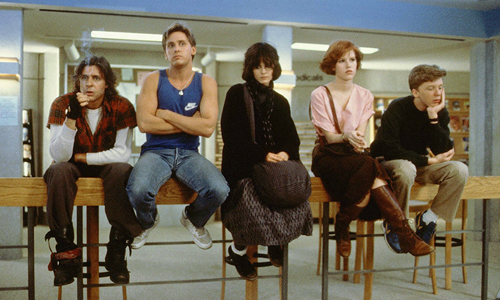 |
Over the years, from when I was just shy of being a teenager to some point in college, the comedies of John Hughes were a recurring stable on a basic cable channel. During that period, while more consumed with action-based antics involving caped crusaders, lightsabers, and ninja turtles, my TV surfing during breaks from those things would routinely stop on that channel upon seeing a spacious library with a group of teenagers settled or settling in for detention. Their language and lingo were observably different than mine, my personality never lined up seamlessly with any of the characters, and the absence of action probably should've driven my attention toward something else … but it didn't. Something drew my attention to the individual facets of each of the teenagers involved in The Breakfast Club, even at a young age, and I found myself identifying with different details of each student -- seeing bits of myself in each -- as the complicated years of adolescence went by and I routinely stopped on the channel to watch it again, seeing if I've taken on a new trait while growing up.
If others are like me, this experience changes a bit as one gets older and moves beyond the ages of the students stuck in detention at Shermer High School on that Saturday morning. Adults begin to settle into the personalities that they've become, and a change happens in how the cluster of five students are viewed as they plop down in their chairs and get ready for, essentially, a work day's amount of sitting around and doing nothing outside of a required essay, contemplating the negative impacts of
 their actions. Instead, reminiscence takes over as one watches a brain (Anthony Michael Hall), an athlete (Emilio Estevez), a basket case (Ally Sheedy), a princess (Molly Ringwald), and a criminal (Judd Nelson) start to interact with one another, outside the earshot and visible range of vice-principal Vernon (Paul Gleason). The camaraderie and clashes between these divided personality types that speak directly to high-school aged people becomes a representation of past growing pains: a reflection of how individuals mature and develop awareness of others. With time, it becomes a reminder, both of what's been overcome and what kids of that age go through to reach adulthood.
their actions. Instead, reminiscence takes over as one watches a brain (Anthony Michael Hall), an athlete (Emilio Estevez), a basket case (Ally Sheedy), a princess (Molly Ringwald), and a criminal (Judd Nelson) start to interact with one another, outside the earshot and visible range of vice-principal Vernon (Paul Gleason). The camaraderie and clashes between these divided personality types that speak directly to high-school aged people becomes a representation of past growing pains: a reflection of how individuals mature and develop awareness of others. With time, it becomes a reminder, both of what's been overcome and what kids of that age go through to reach adulthood. In terms of how the plot develops, not a lot happens in The Breakfast Club, similarly to the amount of stuff that happens in detention itself. The premise anchors the characters to a single location for eight hours, and the barest of movement, even between nearby desk chairs, is observed as something significant in the story, let alone if they find a way of sneaking out of their Saturday imprisonment for whatever reason. Instead, the film's interest arises once the characters start to disclose more about themselves, at first hesitantly and later with the compulsion to reveal what they're hiding underneath … the versions of themselves that don't conform to their labels. John Hughes smartly plays with stereotypes and personality types once their guards are lowered, and they're able -- and, to different degrees, willing -- to see one another for who they really are, hinged on topics from sexual activity, parties, and drugs to how their parents treat them and where they're headed. In a school environment, it can be hard to look beyond base evaluations of people, and breaking through that to see nuanced individuals is a big part of growing up.
By Hughes' design, each character strongly projects their individual stereotypes at first, exaggerated for effect both on a cinematic level and, in a way, on a meta level. By having the characters represented as such clear-cut depictions of who they're pigeon-holed into being, it makes the process of breaking down their barriers more apparent and humorous, eventually transforming into starker before-after contrasts than if they had been presented as multi-layered characters from the get-go. Their rigid embodiment of the
 stereotypes are also easy to stomach since people, both young and old, can fall into the trappings of their social labels, making it easy for rich princesses to feel comfortable eating sushi at a detention lunch and for ostracized weirdos to feel comfortable shaking dandruff onto a landscape illustration to create "snow". Also, writer/director Hughes takes into consideration the inherent compulsion of people to evaluate others based on impressions and outward appearances, how they're summarized through inference and labeling, a real-world experience worked into his teen comedy by prompting the audience -- whether they want to or not -- to see and find amusement in the surface before going deeper.
stereotypes are also easy to stomach since people, both young and old, can fall into the trappings of their social labels, making it easy for rich princesses to feel comfortable eating sushi at a detention lunch and for ostracized weirdos to feel comfortable shaking dandruff onto a landscape illustration to create "snow". Also, writer/director Hughes takes into consideration the inherent compulsion of people to evaluate others based on impressions and outward appearances, how they're summarized through inference and labeling, a real-world experience worked into his teen comedy by prompting the audience -- whether they want to or not -- to see and find amusement in the surface before going deeper. Eventually, of course, it's revealed that more -- perhaps not much more, but more -- lies under those surfaces of the five teenagers than initially led on, and it's seeing how similarities and kinships form despite their differences that keeps The Breakfast Club so relevant over time. Even though he's the most volatile and obnoxious by a wide margin, Judd Nelson's John Bender also becomes the catalyst for the rest to break the rules, speak up, and genuinely communicate with one another, and the sparks of his wounded, closeted personality underneath the gruff surface earn him genuine sympathy while rubbing his detention mates the wrong way. Bender's the focal point, and the rest eventually feel disarmed enough by his brazen attitude to come out of their own shells, to which the credible performances from all involved expose the pressures that each of their characters deal with behind the scenes: the necessity of earning college scholarships based on consistent performance; the complications of popularity, both gaining and maintaining it or not caring about it; and the complicated relationships they share with their parents.
Something unexpected popped up this latest time of watching The Breakfast Club, though, hinged on a flicker of a moment featuring vice-principal Vernon. From the beginning, he's framed as the overbearing and control-hungry villain through his generally unpleasant demeanor, delivered with amusing sternness in a way only Paul Gleason could've done. Yet, there's a key moment after one of his intense, dramatically potent outbursts of scolding that the point-of-view catches a
 look at him exhaling, closing his eyes, and shaking off visible stress: a piece of the iconic "cracking skulls" scene that gets overlooked (or, in clips, cut off). In one's younger years of unanimously siding with the teenagers, that moment might be viewed as just a breath following a tense moment. Older viewers might pick up on more from that expression, though, in which the trickiness of correctly handling problem kids -- the responsibility of slightly influencing that generation's youth -- clearly weighs on him. He's still an unmistakable jerk, indisputably revealed in later interactions, but there's a glimmer of sympathy felt for his position there.
look at him exhaling, closing his eyes, and shaking off visible stress: a piece of the iconic "cracking skulls" scene that gets overlooked (or, in clips, cut off). In one's younger years of unanimously siding with the teenagers, that moment might be viewed as just a breath following a tense moment. Older viewers might pick up on more from that expression, though, in which the trickiness of correctly handling problem kids -- the responsibility of slightly influencing that generation's youth -- clearly weighs on him. He's still an unmistakable jerk, indisputably revealed in later interactions, but there's a glimmer of sympathy felt for his position there. That's one of the more remarkable aspects of The Breakfast Club: while impressions of John Hughes' cautious, considerate mix of exaggerated and nuanced characterization may change with time, they don't seem to get outright replaced by cynicism or frustration with the detention-goers. In the growingly complex world of adulthood, the urge might come up for some individuals to look at most of their concerns with world-weary eyes and deem them as overblown, as facets of youth that'll be conquered as they approach the true trials of the post-high-school existence. Hughes' craftsmanship holds the ability to sidestep those inclinations, perhaps even serving as a reminder to not engage in that kind of stereotyping in the adult world, all the while grasping onto the idea that the concerns of youth and how they'll conquer them, both trivial and momentous, are indeed significant and will shape how they'll handle the challenges in the years to come. Watching The Breakfast Club over a matter of decades has become an exercise in evolving personal outlooks and appreciation, making it hard to forget about it.
The Blu-ray:
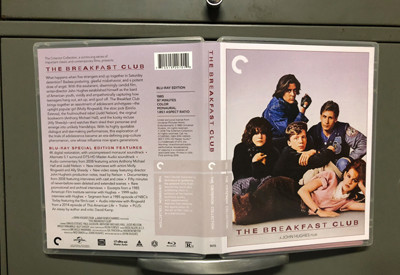 | 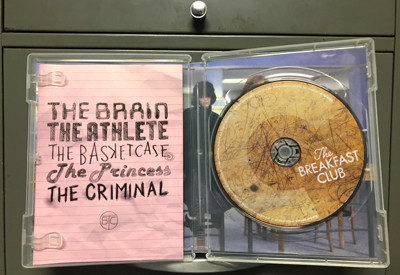 |
The Breakfast Club becomes the somewhat divisive first entry into the Criterion Collection from the works of John Hughes, presented in the standard clear keepcase design from the boutique label, introduced as Spine #905. Criterion keeps things simple with the familiar stock photo of the five primary cast members adorning the front cover artwork, while another full-cast photo spreads across the interior artwork. Creativity comes in the disc design, a depiction of scrawls one might've found on "basketcase" Allison's desk during detention, while the Booklet features pink lined pages, snippets from the script, tchotchkes from the film, and behind-the-scenes photos scattered throughout. Inside, information about the transfer and production credits have been included, as well as an essay, "Smells Like Teen Realness" by David Kamp.
Video and Audio:
This marks the third time that The Breakfast Club has been presented in a different Blu-ray package over the past decade, including a 30th Anniversary Edition remastering from Universal that took great strides to clean up the harsher, less lifelike, yet still acceptable appearance of their first attempt. Had this presentation from Criterion been the one that followed the original release, I'd be singing its praises from the rooftops, as it's a rich (sometimes warmer, others a tad cooler) extremely well-detailed, and natural rendering of the ‘80s film at its intended aspect ratio of 1.85:1, created on an ARRISCAN scanner from the original 35mm negative. Thing is, the differences between this disc's transfer and that of the 30th Anniversary release from three years prior are imperceptible at best, perhaps nonexistent. While that's a great thing for fans of the film wanting a cohesive viewing experience between the prior edition and the coveted Criterion Collection edition, it presents less initiative to upgrade from the prior disc. If you have the first Blu-ray or haven't bought The Breakfast Club at all, however, it's certainly the one to get, as it's been beautifully remastered and restored at 4K under Universal's supervision.
Similar comments can be passed between the two 5.1 DTS-HD Master Audio tracks present on each of the recent Blu-rays for The Breakfast Club: they're satisfyingly clear and capture the atmosphere of library detention, but they also sporadically have twang of thirty years and come across as glorified mono tracks, with ever-so-slight steps of activity over into the front surrounds and wisps into the back. Luckily, The Criterion Collection does contain a boost in the value of the audiovisual presentation here, also offering the original monaural sound design in an LPCM track, derived from the original 35mm negative. It's an improvement, too … in the areas where it can, of course. The presence of sounds effects -- the squeaking of shoes, the hocking of loogies, and the bouncing of a basketball -- thankfully lacks some of the overzealous clarity and levity of the Master Audio track, finding a more comfortable and purely cleaner comfort zone in the center channel. Dialogue also sounds crisper yet more organic within the LPCM presentation, while the music sounds about as excellently balanced as it did before. Having the choice for uniformity's sake is nice, but the LPCM track's the way to go.
Special Features:
If there's an area where this Criterion Collection presentation of The Breakfast Club could unarguably earn the double-dipping price of admission, it's in the extras department. It has some moderately big shoes to fill in comparison to the 30th Anniversary Edition, too, which contained an Audio Commentary with Judd Nelson and Anthony Michael Hall and nearly an hour's worth of behind-the-scenes examinations with the Sincerely Yours (51:00, 16x9 HD) featurette slate. Now, Criterion haven't carried over all the extras from that disc -- they've ditched a trivia track and a five-minute look at the creation of the "Brat Pack" -- but they have brought over those two crucial substantive extras for fans of the film. The commentary track with Nelson and AMH (and moderator Jason Hillhouse) remains a decent enough listen in terms of details revealed about the production design, actors, and the ideas explored, but runs out of steam as the track continues on and gets in a rhythm of narrating and lightly responding to the movie itself. But, at least it's there!
 Instead, The Criterion Collection deepen the value of their package with their own slate of extras, which includes some newly created specifically for this release and a handful of other archival pieces. The Cast and Crew wing of the extras includes a series of archival interviews with actors Judd Nelson (12:36, 4x3 HD), Ally Sheedy (15:23, 4x3), Paul Gleason (11:09, 4x3) and studio teacher Irene Brafstein (8:58, 4x3 HD); specifically in the case of Nelson and Sheedy, it's entertaining to see them in full costume, yet not in character and talking about their experiences shooting the film with John Hughes. Starting the interviews off, however, is a newly-recorded one from 2017 with Molly Ringwald and Ally Sheedy (18:38, 16x9 HD), in which both offer candid recollections of how they got involved with Hughes at that point in their careers, how Hughes was able to lower the actors' guards and draw out their characters, the play-like nature of the script and how it evolved leading up to shooting, Hughes' connection to the teenage experience, and the role that editor Dede Allen played in ensuring Hughes got all the footage he needed.
Instead, The Criterion Collection deepen the value of their package with their own slate of extras, which includes some newly created specifically for this release and a handful of other archival pieces. The Cast and Crew wing of the extras includes a series of archival interviews with actors Judd Nelson (12:36, 4x3 HD), Ally Sheedy (15:23, 4x3), Paul Gleason (11:09, 4x3) and studio teacher Irene Brafstein (8:58, 4x3 HD); specifically in the case of Nelson and Sheedy, it's entertaining to see them in full costume, yet not in character and talking about their experiences shooting the film with John Hughes. Starting the interviews off, however, is a newly-recorded one from 2017 with Molly Ringwald and Ally Sheedy (18:38, 16x9 HD), in which both offer candid recollections of how they got involved with Hughes at that point in their careers, how Hughes was able to lower the actors' guards and draw out their characters, the play-like nature of the script and how it evolved leading up to shooting, Hughes' connection to the teenage experience, and the role that editor Dede Allen played in ensuring Hughes got all the footage he needed. Outside the Cast and Crew wing lies an extensive, exhaustive array of archival footage and elements, but the other extra crafted for the Criterion Collection pops up at the end of the list, entitled Describe the Ruckus (12:13, 16x9 HD). Actor Judd Nelson reads from John Hughes production notes, which reads like the lead descriptions of scenes, locations, and character temperaments from the script before delving into the story's developments, featuring some intriguing naming of the characters, deviations from the final project, and an overall glimpse at Hughes' stream of consciousness. The Criterion Collection have also tracked down nearly an hour of Deleted and Extended Scenes (51:39, 4x3 HD), which had filled out a rough cut of The Breakfast Club to almost two-and-a-half hours in length, including a glimpse at Claire and Allison conversing in the bathroom, Carl the Janitor's evaluations of all the students, and some further acting-out of the kids' home lives and elaborations on why they're there. It's easy to see why the scenes were trimmed for length, flow, and redundancy, but there's a lot of good stuff here.
John Hughes himself hasn't been left out of the extras, though, as two audio-only Interviews have also been included with the package that involve him directly: a lengthy chat from the American Film Institute from 1985 (47:21), which touches on aspects of Hughes' early career and on The Breakfast Club itself; and another, shorter, more retrospective one from Sound Opinions from 1999 (16:05). An Electronic Press Kit (23:49, 4x3 HD) features vintage snippets focused on interviews with the Hughes and the cast, as one would expect from the description, scaling through profiles, "news stories" attaching it to the intentions of American Graffiti and The Graduate, and a general featurette more directly led by Hughes. Within, a Theatrical Trailer (1:26, 4x3 HD) can be played independently from everything else. The Criterion Collection have also included an excerpt from the morning broadcast show Today (9:42, 4x3 HD) from 1985, which features Judd Nelson and Molly Ringwald being interviewed and talking about their process of creating their characters, and a pretty interesting audio-only interview with Molly Ringwald and her daughter for This American Life (15:13) that illustrates some of her own evolution of watching the film as she's grown older.
Final Thoughts:
The Criterion Collection took a little heat from home-media enthusiasts when they announced that they would be releasing The Breakfast Club, marking the third time that the film has been released on the Blu-ray format while many other films -- including, as of this writing, a pair of John Hughes' other works, Curly Sue and She's Having a Baby -- haven't been released at all and probably needed the attention more than it. It's a common talking point among devotees of the label, but considering the high quality of the 30th Anniversary Edition released just three years prior, this particular conversation carried more merit. With a great visual transfer and a healthy number of extras on the Universal disc, there seemed to be little reason for its integration into the collection and receiving the "Criterion treatment" ... beyond, of course, it being a terrific and meaningful Hughes work about stereotyping, pressure, and the teenage experience. Despite loving the film and being excited for their extra efforts, I felt that the trepidation over this release might be justified, even considering that bigger releases like this help to finance their more off-the-beaten-path pursuits.
The folks at Criterion clearly understood this, and understood that there wasn't much improvement that could be done to the way The Breakfast Club looks, because they've more than justified this release's existence in other areas: an exceptional presentation of the original monaural track; meaningful cohesiveness with the options and extras of the previous releases; and an absurd number of both new and archival/vintage extras that includes almost an hour of deleted/extended scenes, interviews with the cast during and shortly after filming, a new piece featuring Molly Ringwald and Ally Sheedy that follows Criterion's standard candid rhythm, and a lot more. Clearly as a fan of the film and a skeptic as to whether this presentation of The Breakfast Club could deliver enough to merit yet another release, I feel this package as a whole to be essential for both new buyers and those who've already picked up the 30th Anniversary release: for those looking to own it in the best possible fashion and not wait for it to show up again on basic cable. DVDTalk Collector Series.
|
| Popular Reviews |
| Sponsored Links |
|
|
| Sponsored Links |
|
|
| Release List | Reviews | Shop | Newsletter | Forum | DVD Giveaways | Blu-Ray | Advertise |
|
Copyright 2024 DVDTalk.com All Rights Reserved. Legal Info, Privacy Policy, Terms of Use,
Manage Preferences,
Your Privacy Choices | |||||||









